
Books School of Communications
Publications - Books
2014: Books by School of Communications Staff
POLITICAL COMMUNICATION IN THE REPUBLIC OF IRELAND
Mark O’Brien & Donnacha Ó Beacháin, Editors Liverpool University Press, 2014
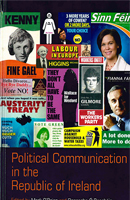 What should individuals and society do when genetic screening becomes widely available and with its impact on current and future generations still uncertain? How can our education systems around the world respond to these developments?
What should individuals and society do when genetic screening becomes widely available and with its impact on current and future generations still uncertain? How can our education systems around the world respond to these developments?
About the book This book presents an overview of political communication in the Republic of Ireland from a multiplicity of perspectives and sources. It brings together academics and practitioners to examine the development and current shape of political communication in modern Ireland. It also examines what the future holds for political communication in an increasingly gatekeeper-free media landscape. The field of political communication, where journalists, public relations professionals and politicians intersect and interact, has always been a highly contested one fuelled by suspicion, mutual dependence and fraught relationships.
While politicians need the media they remain highly suspicious of journalists. While journalists remain wary of politicians, they need access to them for information. For most of the time, what emerges is a relatively stable relationship of mutual dependence with the boundaries policed by public relation professions. However, every so often, in times of political crisis or upheaval, this relationship gives way to a near free-for-all. Politicians, spokespersons and sometimes even journalists, become fair game in the battle for public accountability and support. The determination of public relations professions to avoid this and keep the relationship based on mutual dependence has become a central component of modern statecraft and systems of governance.
The need to keep politicians and the media ‘on message’ and use the media to inform, shape and manage public discourse has become central to the workings of government, opposition and interest groups. On the other hand, the packaging of politics has potentially troublesome implications for the democratic process. In the era of the instant news cycle, new technologies and constant opinion polling, just where does information end and misinformation begin? With millions being spent annually on advisors and ‘spin-doctors’, just where does media access end and media manipulation begin?.
Biotechnology, Education and Life Politics Debating genetic futures from school to society
Padraig Murphy(2014)
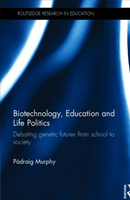 What should individuals and society do when genetic screening becomes widely available and with its impact on current and future generations still uncertain? How can our education systems around the world respond to these developments?
What should individuals and society do when genetic screening becomes widely available and with its impact on current and future generations still uncertain? How can our education systems around the world respond to these developments?
Reproductive and genetic technologies (RGTs) are increasingly controversial and political. We are entering an era where we can design future humans, firstly, by genetic screening of "undesirable" traits or indeed embryos, but perhaps later by more radical genetic engineering. This has a profound effect on what we see as normal, acceptable and responsible.
This book argues that these urgent and biopolitical issues should be central to how biology is taught as a subject. Debate about life itself has always been at the forefront of connected molecular, genetic and social/personal identity levels, and each of these levels requires processes of communication and debate, what Anthony Giddens called in passing life politics. In this book Pádraig Murphy opens the term up, with examples from field research in schools, student responses to educational films exploring the future of RGTs, and science studies of strategic biotechnology and the lab practices of genetic screening. Life political debate is thoroughly examined and is identified as a way of connecting mainstream education of biology with future generations.
Biotechnology, Education and Life Politics will appeal to post-graduates and academics involved with science education, science communication, communication studies and the sociology of education.
2013: Books by School of Communications Staff
The Death and Life of the Music Industry in the Digital Age
Jim Rogers(2012)
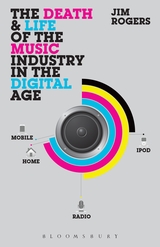 The Death and Life of the Music Industry in the Digital Age challenges the conventional wisdom that the internet is 'killing' the music industry. While technological innovations (primarily in the form of peer-to-peer file-sharing) have evolved to threaten the economic health of major transnational music companies, Rogers illustrates how those same companies have themselves formulated highly innovative response strategies to negate the harmful effects of the internet. In short, it documents how the radical transformative potential of the internet is being suppressed by legal and organisational innovations. Grounded in a social shaping perspective, The Death and Life of the Music Industry in the Digital Age contends that the internet has not altered pre-existing power relations in the music industry where a small handful of very large corporations have long since established an oligopolistic dominance. Furthermore, the book contends that widespread acceptance of the idea that online piracy is rampant, and music largely 'free' actually helps these major music companies in their quest to bolster their power. In doing this, the study serves to deflate much of the transformative hype and digital 'deliria' that has accompanied the internet's evolution as a medium for mass communication.
The Death and Life of the Music Industry in the Digital Age challenges the conventional wisdom that the internet is 'killing' the music industry. While technological innovations (primarily in the form of peer-to-peer file-sharing) have evolved to threaten the economic health of major transnational music companies, Rogers illustrates how those same companies have themselves formulated highly innovative response strategies to negate the harmful effects of the internet. In short, it documents how the radical transformative potential of the internet is being suppressed by legal and organisational innovations. Grounded in a social shaping perspective, The Death and Life of the Music Industry in the Digital Age contends that the internet has not altered pre-existing power relations in the music industry where a small handful of very large corporations have long since established an oligopolistic dominance. Furthermore, the book contends that widespread acceptance of the idea that online piracy is rampant, and music largely 'free' actually helps these major music companies in their quest to bolster their power. In doing this, the study serves to deflate much of the transformative hype and digital 'deliria' that has accompanied the internet's evolution as a medium for mass communication.
Reviews
“The cries of distress are incessant, the doom-sayers never silent: ‘the internet is killing the music industry’. Well, no! Here is a bucket of scholarly, brilliantly researched water to douse this particular hyperbolic claim of destruction-by-technology. Using Ireland as a case study, Jim Rogers carefully demonstrates how the music industry is successfully coping with its changed circumstances – as it has done, after all, for a century past. The Death and Life of the Music Industry in the digital age is a crucial (and welcome) antidote to received opinion. We need more like it.” – Brian Winston, Professor, University of Lincoln, UK,
“Jim Rogers' carefully documented analysis is a welcome relief from the "digital deliria" often associated with discussions of the music industry. A welcome contribution to the growing literature on the political economy of the evolving media industries.” – Janet Wasko, Professor and Knight Chair for Communication Research, University of Oregon, US,
2012: Books by School of Communications Staff
Smart Cinema, DVD Add-Ons and New Audience Pleasures
Pat Brereton(2012)
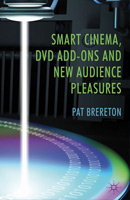 Smart movies broadly encapsulate what have been described as a reflexive and playful postmodern tendency and are augmented by the specific attributes of contemporary new digital media. These new attributes are drawn from video games and music videos in particular, as well as other new generational e-pleasures and tastes. Pat Brereton examines a broad range of post-1990s Indie and mainstream films that break many of the old classic linear narrative and generic rules which helped to define Hollywood and its alternative 'art' cinema. This work particularly explores how bonus features attached to smart DVDs are capable of speaking to new generational audiences. There is a continuing need for a creative and critical dialogue with new generations of students and audiences to help reinvigorate the study of film. DVD add-ons provide a useful bridge between new media and conventional film study, while assisting in exploring how new generational film fans relate to smart cinema.
Smart movies broadly encapsulate what have been described as a reflexive and playful postmodern tendency and are augmented by the specific attributes of contemporary new digital media. These new attributes are drawn from video games and music videos in particular, as well as other new generational e-pleasures and tastes. Pat Brereton examines a broad range of post-1990s Indie and mainstream films that break many of the old classic linear narrative and generic rules which helped to define Hollywood and its alternative 'art' cinema. This work particularly explores how bonus features attached to smart DVDs are capable of speaking to new generational audiences. There is a continuing need for a creative and critical dialogue with new generations of students and audiences to help reinvigorate the study of film. DVD add-ons provide a useful bridge between new media and conventional film study, while assisting in exploring how new generational film fans relate to smart cinema.
Reviews
"Through accessible and insightful close readings, Smart Cinema brings together movies from different countries, genres, and directors in order to show how how these films participate in the wider cultures of cinephilia. Brereton is especially sharp in his assessment of the role of DVD extras in promoting new modes of cinematic storytelling."
- Chuck Tryon, Fayetteville State University, USA
"From Donnie Darko to Pixar, this is a fascinating and timely overview of 21st Century western cinema's defining feature: its smartness. Brereton gives new insights into the digital technologies, complex storytelling and savvy audiences that typify film culture today, through accessible analyses of Pulp Fiction, Fight Club, Be Kind Rewind, In Bruges, Inception and many others. As smart as the films it studies."
- Ernest Mathijs, University of British Columbia, Canada
Men and Masculinities in Irish Cinema
Debbie Ging( 2012)
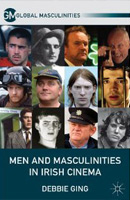 Spanning a broad trajectory, from the New Gaelic Man of post-independence Ireland to the slick urban gangsters of contemporary productions, this study traces a significant shift from idealistic images of Irish manhood to a much more diverse and gender-politically ambiguous range of male identities on the Irish screen. Ging argues that Irish filmmakers have been instrumental to identifying critical flashpoints and fissures in the 'masculinity' debate, sometimes long before sociologists, psychologists and the news media. She tracks evolving cinematic discourses on manhood, from the early period of nationalist filmmaking through the First Wave's unusually anti-patriarchal and anti-nationalist interventions, to post-Celtic Tiger cinema's engagements with postfeminism, New Laddism and Raunch Culture. This is a compelling and insightful story about the development of male identities in Irish cinema over the past century.
Spanning a broad trajectory, from the New Gaelic Man of post-independence Ireland to the slick urban gangsters of contemporary productions, this study traces a significant shift from idealistic images of Irish manhood to a much more diverse and gender-politically ambiguous range of male identities on the Irish screen. Ging argues that Irish filmmakers have been instrumental to identifying critical flashpoints and fissures in the 'masculinity' debate, sometimes long before sociologists, psychologists and the news media. She tracks evolving cinematic discourses on manhood, from the early period of nationalist filmmaking through the First Wave's unusually anti-patriarchal and anti-nationalist interventions, to post-Celtic Tiger cinema's engagements with postfeminism, New Laddism and Raunch Culture. This is a compelling and insightful story about the development of male identities in Irish cinema over the past century.
Reviews
"Debbie Ging has written an important, timely and sharply focused study which delineates the shifting contours in the representation of masculinity in Irish cinema. Covering the whole of its history, Ging relates the changes in cinematic masculinities to broader social and cultural debates and shows the importance of images of men to the construction of national identities. This ambitious study fills an important gap in the literature on Irish cinema and makes a thoughtful contribution to the expanding corpus of studies of men on film."
- Andrew Spicer, Reader in Cultural History, University of the West of England (Bristol), author of Typical Men: Masculinity in British Cinema
"Long marginalized in stereotypic representations, the emergence of a distinctively Irish cinema also heralded new, locally produced images of Irish masculinities that span a far wider range than before. Debbie Ging uses this history as a lens through which to view the emergence of Ireland itself as a significant cultural force in Europe and the world - and a contributor of gendered identities that are both original and worthy of emulation."
- Michael Kimmel, Distinguished University Professor of Sociology, State University of New York, author of Manhood in America
Independent Newspapers: A History
Mark O'Brien & Kevin Rafter (eds)(2012)
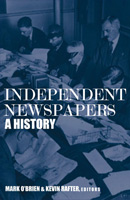 For over a century, Independent Newspapers has been the most successful media organization in Ireland. From William Martin Murphy to Tony O'Reilly, the newspaper group has long been at the centre of public life, often in controversial circumstances. In this revealing volume, fourteen leading scholars examine the interaction between proprietors and the newspapers, the company's journalists and journalism, and the relationship between the newspapers and Irish society.
For over a century, Independent Newspapers has been the most successful media organization in Ireland. From William Martin Murphy to Tony O'Reilly, the newspaper group has long been at the centre of public life, often in controversial circumstances. In this revealing volume, fourteen leading scholars examine the interaction between proprietors and the newspapers, the company's journalists and journalism, and the relationship between the newspapers and Irish society.
2011: Books by School of Communications Staff
New Vocabularies, Old Ideas: Culture, Irishness and the Advertising Industry
Neil O’Boyle(2011)
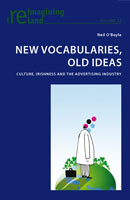 Advertisements are often viewed as indices of cultural change, just as the advertising industry is often imagined as innovative and transformative. Advancing from an alternative position, which borrows much from practice-based research, this book instead highlights the routinisation of practices and representations in advertising. Drawing extensively from his own study, Neil O'Boyle uses Irishness to investigate the relationship between cultural symbolism in advertising and the cultural vocabularies of advertising practitioners. While globalisation and immigration to Ireland have putatively unhinged taken-for-granted understandings of Irish identity, he argues that representations of Ireland and Irishness in the global context continue to draw from a stock of particularisms and that advertising practitioners continue to operate with largely essentialist understandings of culture and identity. As the first of its kind in Ireland, Neil O'Boyle's book makes a case for renewed attention to advertising by academic scholars and promotes the benefits of interdisciplinary research.
Advertisements are often viewed as indices of cultural change, just as the advertising industry is often imagined as innovative and transformative. Advancing from an alternative position, which borrows much from practice-based research, this book instead highlights the routinisation of practices and representations in advertising. Drawing extensively from his own study, Neil O'Boyle uses Irishness to investigate the relationship between cultural symbolism in advertising and the cultural vocabularies of advertising practitioners. While globalisation and immigration to Ireland have putatively unhinged taken-for-granted understandings of Irish identity, he argues that representations of Ireland and Irishness in the global context continue to draw from a stock of particularisms and that advertising practitioners continue to operate with largely essentialist understandings of culture and identity. As the first of its kind in Ireland, Neil O'Boyle's book makes a case for renewed attention to advertising by academic scholars and promotes the benefits of interdisciplinary research.
Reviews
"Neil O'Boyle's study of Irishness and the Irish advertising business significantly enriches our understanding of important industrial and cultural phenomena. His deft analysis treats a number of key and interrelated dynamics including national identity, representation and self-representation, consumerism and globalisation. Among the book's many strengths is the way it opens up a lens on Celtic Tiger circumstances in a post-Celtic Tiger era.
-Diane Negra, Professor of Film Studies and Screen Culture, University College Dublin.
The Power of Silence: Silent Communication in Daily Life
Prof. Colum Kenny(2011)
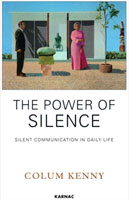 Colum Kenny explores the significance of silence in the arts, business, personal relationships, therapy, faith, politics, and other areas of daily life. This book demonstrates that silence is eloquent, powerful, beautiful and even dangerous. It surrounds and permeates our daily lives. Drawing on a wide range of cross-cultural, literary and historical sources, the author explores the uses and abuses of silence. He explains how silence is not associated with solitude alone but has a much broader value within society.
Colum Kenny explores the significance of silence in the arts, business, personal relationships, therapy, faith, politics, and other areas of daily life. This book demonstrates that silence is eloquent, powerful, beautiful and even dangerous. It surrounds and permeates our daily lives. Drawing on a wide range of cross-cultural, literary and historical sources, the author explores the uses and abuses of silence. He explains how silence is not associated with solitude alone but has a much broader value within society.
The main themes of The Power of Silence are positive and negative uses of silence, and the various ways in which silence has been understood culturally, socially and spiritually. The book's objectives are to equip people with a better appreciation of the value of silence and to enable them to explore its benefits and uses more easily for themselves. The Book has featured in An Irishwoman's Diary in the Irish Times and also been the focus of a radio interview on The Pat Kenny Show
